In jail with Pablo López Alavez, 13 years behind bars in Mexico for a crime he did not commit
EL PAÍS visited the Indigenous Zapotec leader inside his prison cell. According to the UN, he was convicted and jailed for a fabricated murder: ‘The real reason for the arrest and prosecution of López Alavez is his activity as a defender of the human rights of his community’
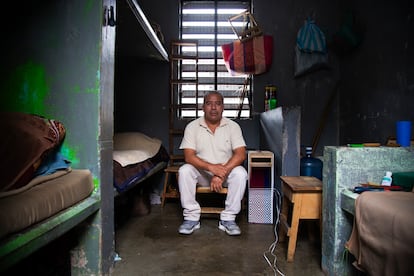

As the photographer from EL PAÍS takes pictures of the inmate in cell 13, all the other prisoners in Sector C of the Villa de Etla Social Reintegration Center are watchful. Nobody speaks in the gallery – the only sound can be heard from a television that, in the middle of the corridor, is broadcasting a soap opera. Until a moment ago, that show was the main excitement of the day. Looking over the railings from the second floor, or peeking out from their cells, the eyes don’t miss a single click made by the camera.
Pablo López Alavez, 54, poses formally inside the gray cement cell that he shares with four other convicts. It’s one of the last mornings of July. He has just finished an interview with EL PAÍS, in which he told his story: that of a Zapotec Indigenous man from the mountains of Oaxaca, persecuted for his iron-clad defense of land and water, sentenced to 30 years in prison for a crime that – according to the United Nations – he didn’t commit.
The guards wear black, while López Alavez – like the rest of the prisoners – is dressed in khaki. He has spent 13 years in this facility termed “social readaptation center,” a bureaucratic euphemism to avoid referring to it as a prison. He was arrested and imprisoned in 2010, accused of a homicide that occurred three years earlier. The conviction finally came in 2017, and was ratified in 2020. He has defended his innocence from day one. As has the UN, which, on at least two occasions, has asked that the Mexican government oversee his “immediate release.” Successive administrations have never responded.
According to the UN, his detention was “arbitrary,” while the judicial process was riddled with “irregularities” and “significant violations.” The evidence against him was “inconsistent” and there was a “lack of consideration of the evidence presented by the defense that proves that the defendant was not on the scene when the murder was committed.”
“The real reason for the arrest and trial of Mr. López Alavez,” the UN affirms, “is his activity as a defender of the human rights of his community.” The international body has also established that the prisoner has been subject to “acts of ill-treatment, torture and threats on the part of prison officials.”
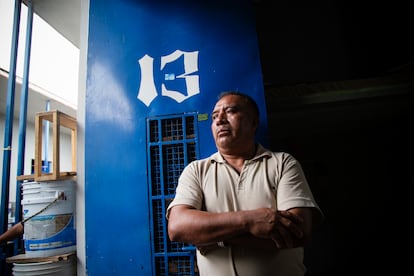
The interview takes place in a small, dirty, windowless room in the prison, under the white light emitted by a single bulb. A variety of sounds slip into the recording: the screeching of locks, metal doors opening and closing, the white noise of the galleries, the calls over the public address system, a choir singing religious songs. It’s hot – the flies fly over López Alavez. He has a buzz cut, a moustache and a large, round face. He tells his story calmly, with a serene voice. Spanish, he admits, is difficult for him at times. His native language is Zapotec, but nobody else inside the prison speaks it.
He was a peasant and a social leader in his community: San Isidro Aloápam. He spent his life defending the mountains against illegal and indiscriminate logging. His work earned him the enmity of local chiefs and businessmen. According to human rights organizations, they used their power and influence to fabricate the accusation against him.
Prison is usually a place that breaks the spirit. The institution has a mathematical and, at the same time, simplistic design that reduces humanity to a number and a crime. However, in his case, it seems that the years behind bars haven’t broken his discipline or his capacity for resilience. It’s difficult to find cracks, at least, in his speech:
“I don’t regret being a defender of nature. Everything I’ve been doing is for the good of the future of my children and grandchildren, of my community. The water that reaches the town comes from the hill that we conserve. Our grandparents protected it – they died, but we continued. We’re just passing by, but our children will remain. I don’t know how many generations will pass and take advantage of everything we have fought for. If we let our municipality continue logging year after year, what will happen? Over the years, the streams have dried up. If we don’t take care of the forest, everything will collapse.”
When the Indigenous leader was arrested, Ulises Ruiz Ortiz – now a long-shot independent candidate for the presidency in the 2024 elections – governed the Mexican state of Oaxaca with the Institutional Revolutionary Party (PRI). His administration was marked by scandal and controversy. There was a “pattern of violations” against defenders of nature and human rights across the state, according to the UN. Damián Gallardo was one of the victims of this government – a rural teacher and activist who was unjustly imprisoned, his case is identical to that of López Alavez. This past May, Mexico apologized to Gallardo for “serious violations of his human rights” and his “arbitrary detention and torture.” Gallardo took advantage of this public apology to demand the freedom of López Alavez.
The Zapotec leader blames the former governor for his imprisonment. “The PRI government fabricated these crimes. Today, I’m making a statement to President Andrés Manuel López Obrador (of the MORENA political party): I hope my voice reaches his ears and that he takes action on the matter. I also make this statement to Salomón Jara (the current governor of Oaxaca): please don’t forget the suffering of Indigenous people.”
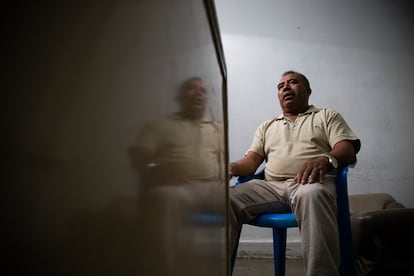
Kidnapping by a group of armed men
On August 15, 2010, López Alavez was driving home with his wife – Yolanda Pérez Cruz – and their grandson. A red van blocked their path. The driver got out: “Now you’re fucked!” he yelled. Fifteen men – dressed in black, hooded, carrying automatic weapons – descended from the rear. When the social leader tried to make sense of what was happening, the men had already immobilized his wife and grandson, putting them on the ground. They then beat López Alavez, threw him face down in their vehicle and drove off. To confuse anybody who may have been on their trail, they changed cars several times.
The kidnappers drove to an open field that López Alavez could identify, near his town. “There, I could see men and women. When they got me out of the truck, I heard a voice say: ‘It’s him, kill him.’
“I replied: ‘Well, if you have it in you, then go ahead, [pull the trigger], what are you waiting for?’” The hitmen lost their nerve and beat him up. Later, they covered his face and took him away in another vehicle. When, hours later, he was able to see something, he recalled that there were state police officers all around him. They took him to the Etla jail. They never showed him an arrest warrant; no one identified themselves as a law enforcement officer. In prison, he discovered that he was being charged with homicide.
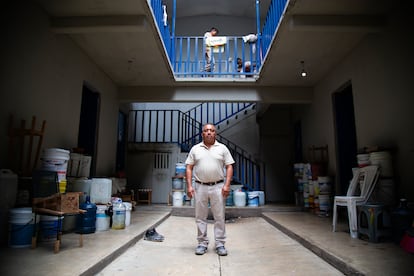
The Etla prison isn’t a very large building. There are only 303 inmates. It’s located next to a cemetery, a chicken shop and a row of houses. The dull white and gray of the prison contrast with the green mountainous horizon of Oaxaca in the background. The soccer field inside the prison – whose walls are decorated with graffiti and murals – is deserted under the noonday sun.
López Alavez walks through the courtyard, closely followed by guards and journalists. Along the way, other prisoners pass by – they greet him with shy but friendly smiles, saying ‘good morning’ before continuing on with their business. Most of the inmates are working – the only thing that can be done to pass the time. They work in the field of carpentry; there’s a workshop with a tin roof and no walls. A couple of dozen men handle logs, pallets, saws and hammers. An old man carves flowers out of wood, while two other inmates weave handicrafts on a loom. Their families will later sell the finished products in the capital.

The Zapotec leader is here almost every day. He’s currently working on a bed frame that looks better than what you’d see in most furniture stores. It’s almost done: he polishes the wood and gives it the final touches. His wife sends him materials and tools – on the outside, she sells whatever he builds. Most of the money he earns goes to his family members, who had to be relocated in the face of constant threats. They now survive precariously, no longer able to cultivate the fields that used to be their way of life.
Working is his way of staying sane. “In order not to get too focused on what’s out there, I have to be working. With work, I manage to forget a little. That’s how I’m handling things.” The days in prison are all the same. López Alavez wakes up at 5:30 a.m. and showers. The guards do a roll call at 7 a.m. Then, he goes to the carpentry workshop. At 1 p.m., they call roll again. He continues working. At half-past-five in the evening, he returns to his area for another count, a shower and then works in his cell until he falls asleep. He eats twice a day – “three tortillas with a little bit of [meat and beans]” – and coffee in the afternoon. “It’s not enough – that’s why my family brings me food. Sometimes, when they can’t come, I get hungry.”
Hunger is almost his only complaint. López Alavez speaks without a trace of emotion – his head is full of data and dates, as if he were a lawyer working his own case, rather than the victim of a judicial set-up that has kept him jailed for over a decade. He is used to narrating his story over and over again: 13 years is a long time to memorize your case, to learn every detail and keep appealing through courts that don’t bother to listen. His concern is for the people he left on the outside – his relatives, his community. In his vocabulary, life is understood not through “I,” but through the collective “we” that weighs more than any notion of individuality.
He barely talks about himself or his feelings; about the inevitable days of loneliness that a human being experiences when they’re behind bars. He doesn’t mention the frustration of living under 24-hour surveillance, the painful memory of freedom, the desire for human warmth, the nostalgia for the green mountains – when his current horizon is a cement wall – or the festivals in the town. We don’t learn of his favorite foods or hear him recall the hugs of his loved ones – common things that, at the same time, are necessary for human beings. When asked what he misses the most, he answers that he misses working in the fields.
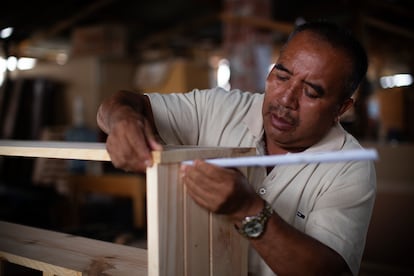
“What’s the first thing you’ll do when you get out?”
“Guarantee better living conditions for my family. For example, today, I talked to my family. I asked, ‘How are you?’ And they answered: “We got a threatening call today, somebody broke into the house to rob me, I’m sick…' My wife is the one who suffers the most when she comes to visit me; that’s why she doesn’t come often, because they’re going to persecute her.”
When asked if he will continue his defense of the land if he is released, he replies – as if it’s the most obvious thing – “Of course.” There’s no room for selfishness in his answers; there’s no room for personal pleasures. There’s just a story governed by an inflexible and extreme concept of sacrifice.
“To date, I haven’t gotten used to jail,” he admits. “I just play by the rules so that I can earn more privileges. Almost all the days are full of sadness… my struggle, my effort, is what calms me down. There are times when [sadness] suddenly wants to overcome me, but I have to face it, in order to get ahead.”
After the interview, the tour of the jail, the photos in the cell, López Alavez escorts the reporters out. He gives each person a big hug, politely thanks them for the visit, asks for phone numbers to stay in touch. The door closes with a clang, leaving him – once again – on the other side.
August 15 will mark the 13th anniversary of his confinement: 4,745 days away from his mountains. After a conviction, a ratification, various appeals, going back and forth between the ins and outs of the legal system, his process still stuck in “the investigative stage in the traditional penal system.” He’s awaiting a new judicial decision that may release him… or leave him behind bars.
“I have faith that I’ll get out one day,” he affirms. Hope is the last thing you lose.
Sign up for our weekly newsletter to get more English-language news coverage from EL PAÍS USA Edition